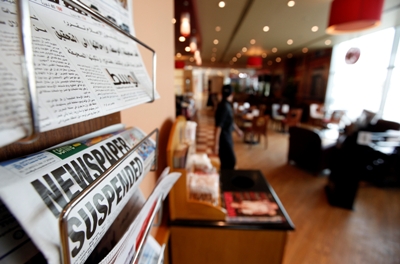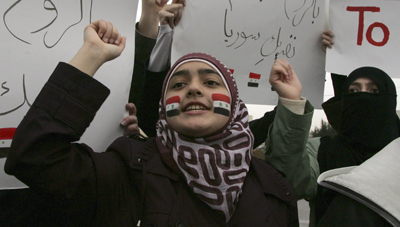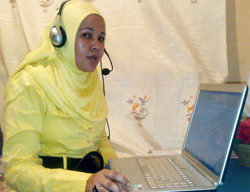Writer threatened during Bailey murder trial
As the trial of suspects charged with murdering Oakland, Calif., reporter and editor Chauncey Bailey continued, a reporter who has written dozens of articles about the case was himself threatened as he investigated allegations of real estate fraud by a business tied to the suspects on trial.

Bahraini blogger dies in custody; journalists under attack
New York, April 12, 2011– The Committee to Protect Journalists called on Bahraini authorities to launch an immediate and thorough investigation into the death of a blogger while in state custody. Bahraini authorities, meanwhile, announced that they would file criminal charges against three senior editors at the Gulf kingdom’s premier independent daily, continuing a months-long…

Threats to Al-Jazeera in Jordan; journalists released in Syria
New York, April 5, 2011–Al-Jazeera staffers in Jordan have received anonymous threatening phone calls warning that their office and correspondents would be attacked, Al-Jazeera’s Amman bureau chief told CPJ. Journalists in Jordan have been facing mounting dangers while covering pro-reform demonstrations, CPJ research has found.
In Ivory Coast, Gbabgo and Ouattara camps attack press
New York, March 28, 2011–The Committee to Protect Journalists condemns ongoing attacks, threats, and intimidation against journalists and news outlets covering the bloody political standoff in Ivory Coast. The government and supporters of incumbent ruler Laurent Gbagbo have been targeting newspapers critical of Gbagbo while rebel fighters backing his U.N.-backed rival Alassane Ouattara have also…

A Somali journalist still gets taunting threats in exile
It was February 2008 when Bahjo Mohamud Abdi received her first anonymous phone call. It was a man’s voice asking her to confirm who she was. Abdi was a presenter and correspondent for the state radio in Somalia’s semi-autonomous region of Puntland. Abdi confirmed her identity and thought no more about it. But then she…
Peruvian news daily attacked; editor threatened
New York, March 9, 2011–The Committee to Protect Journalists condemns the attack on the Peruvian news daily Voces, which was hit with homemade explosive devices on Saturday. The daily’s editor recently received threats following critical reporting on a national congressional candidate, he told CPJ.
Attacks on the Press 2010: Africa Analysis
Across Continent, Governments Criminalize Investigative Reporting By Mohamed Keita Across the continent, the emergence of in-depth reporting and the absence of effective access-to-information laws have set a collision course in which public officials, intent on shielding their activities, are moving aggressively to unmask confidential sources, criminalize the possession of government documents, and retaliate against probing…
Attacks on the Press 2010: Asia Analysis
Partisan Journalism and the Cycle of Repression by Bob Dietz and Shawn W. Crispin Lal Wickramatunga’s family and publishing house, Leader Publications, have paid dearly in Sri Lanka’s highly charged political climate. While Leader’s newspapers, including the weekly Sunday Leader, are widely known for tough, independent reporting, they have been caught up in a partisan…
Guatemalan journalist threatened after corruption probe
New York, February 9, 2011–The Committee to Protect Journalists is concerned about the safety of Guatemalan television journalist Oscar de León, who has received multiple death threats and had his van shot at in the southwestern municipality of Quetzaltenango, according to news reports and CPJ interviews. De León, a correspondent for the private national Guatevisión…